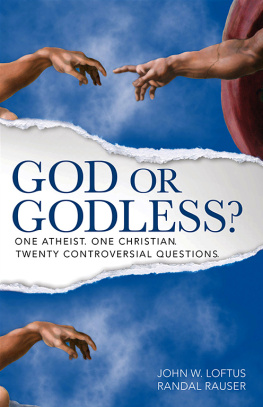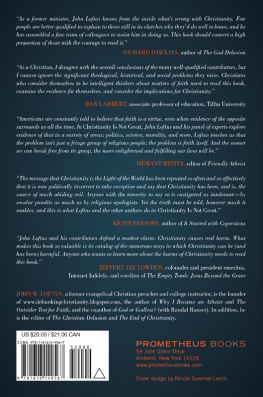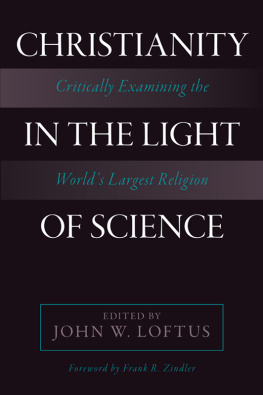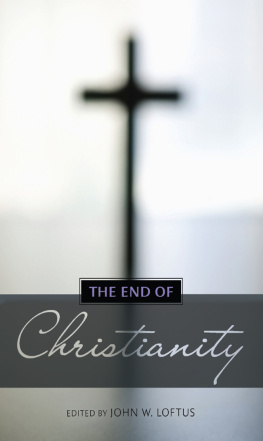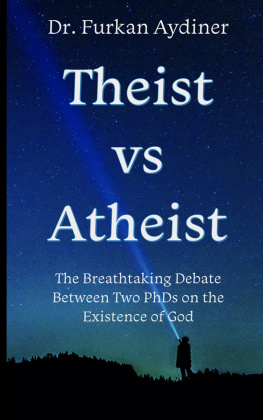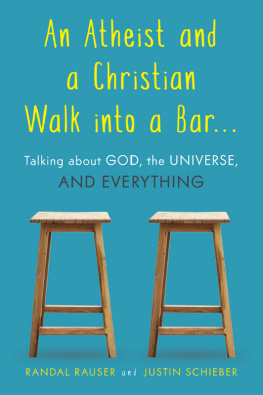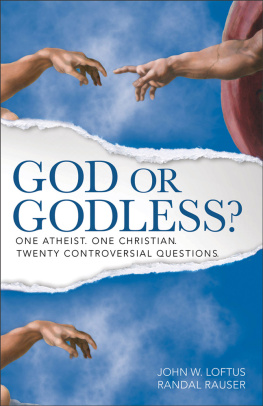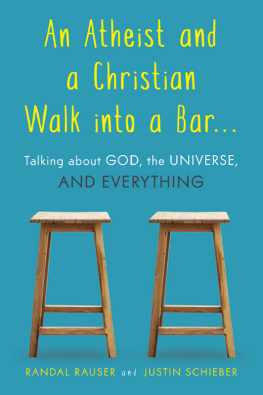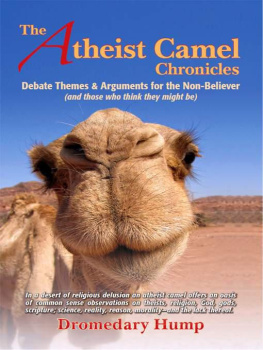
2013 by John W. Loftus and Randal Rauser
Published by Baker Books
a division of Baker Publishing Group
P.O. Box 6287, Grand Rapids, MI 49516-6287
www.bakerbooks.com
Ebook edition created 2013
All rights reserved. No part of this publication may be reproduced, stored in a retrieval system, or transmitted in any form or by any meansfor example, electronic, photocopy, recordingwithout the prior written permission of the publisher. The only exception is brief quotations in printed reviews.
Library of Congress Cataloging-in-Publication Data is on file at the Library of Congress, Washington, DC.
ISBN 978-1-4412-4069-9
Unless otherwise indicated, Scripture quotations are from the Holy Bible, New International Version. NIV. Copyright 1973, 1978, 1984, 2011 by Biblica, Inc. Used by permission of Zondervan. All rights reserved worldwide. www.zondervan.com
Scripture marked KJV is taken from the King James Version of the Bible.
Scripture marked NRSV is taken from the New Revised Standard Version of the Bible, copyright 1989, Division of Christian Education of the National Council of the Churches of Christ in the United States of America. Used by permission. All rights reserved.
Scripture marked RSV is taken from the Revised Standard Version of the Bible, copyright 1952 [2nd edition, 1971] by the Division of Christian Education of the National Council of the Churches of Christ in the United States of America. Used by permission. All rights reserved.
The internet addresses, email addresses, and phone numbers in this book are accurate at the time of publication. They are provided as a resource. Baker Publishing Group does not endorse them or vouch for their content or permanence.
Published in association with the Books & Such Literary Agency, 52 Mission Circle, Suite 122, PMB 170, Santa Rosa, CA 95409-7953.
John I dedicate this book to the various respectful bloggers on both sides of this debate who have fine-tuned my understanding of the issues. Randal In 2003 my doktorvater Colin Gunton, theological mentor and personal friend, passed away unexpectedly just months after my thesis defense. Colin believed theology should be presented unapologetically even as it engages with a skeptical culture. I trust he would have been pleased with the spirit of these debates, and I dedicate this book to his memory. Contents Cover Title Page Copyright Page Dedication Acknowledgments An Irreverent, Interesting, and Somewhat Informative Introduction
1. If There Is No God, Then Life Has No Meaning
2. The Biblical Concept of God Evolved from Polytheism to Monotheism
3. If There Is No God, Then Everything Is Permitted
4. The Biblical God Required Child Sacrifices for His Pleasure
5. Science Is No Substitute for Religion
6. The Biblical God Commanded Genocide
7. God Is the Best Explanation of the Whole Shebang
8. The Biblical God Does Not Care Much about Slaves
9. If There Is No God, Then We Dont Know Anything
10. The Biblical God Does Not Care Much about Women
11. Love Is a Many Splendored Thing, but Only if God Exists
12. The Biblical God Does Not Care Much about Animals
13. Everybody Has Faith
14. The Biblical God Is Ignorant about Science
15. God Is Found in the Majesty of the Hallelujah Chorus
16. The Biblical God Is Ignorant about the Future
17. God Best Explains the Miracles in Peoples Lives
18. The Biblical God Is an Incompetent Creator
19. Jesus Was Resurrected, So Who Do You Think Raised Him?
20. The Biblical God Is an Incompetent Redeemer
The Last Word
Recommended Readings Notes About the Authors Back Cover Acknowledgments
John thanks...
When I first went online to discuss my doubts in 2005, I found a particular evangelical forum that treated me with disdain and vitriol simply because I disagreed. I knew most Christians were not like this, but this group poured gasoline on the fires of my passion like nothing else. They provoked me to go for the jugular vein of a faith that could be used to justify their treatment of people like me. If it hadnt been for them, I probably would have moved on with my life. So I want to acknowledge them for helping to motivate me.
Randal thanks...
First, Id like to express my gratitude to my wife, Jasper, and daughter, Jamie, for their support and patience on this and every other writing project in which I am engaged. Second, Id like to thank Janet Grant, my agent, for her commitment to finding God or Godless the right publisher. Finally, Id like to thank my opponent, John W. Loftus. I appreciate the fact that John is a very capable defender of atheism who argues his case with knowledge and passion. I also appreciate his ability to distinguish arguments from persons and thus maintain cordial relations even in the midst of deep disagreement. For these reasons I am especially grateful for Johns participation in these debates.
An Irreverent, Interesting, and Somewhat Informative Introduction
We (John and Randal) enjoy formal philosophical debates about big and important issues, and they dont come any bigger or more important than the question of whether God exists. But as much as we love formal philosophical debates, they have their drawbacks too. For one thing, they often take way too much time. (Two or three hours in a stuffy lecture theater is a tax on anyones stamina.) For another, they often are a bit too formal (dare we say anal-retentive ?). And finally, they are often fixated on a narrow set of questions that, while important, have been asked a million times before, like Does God exist? and Did Jesus rise from the dead? Important and interesting questions to be sure, but there are different ways to slice the pie, and we think it is high time to approach from some fresh angles the same old debate over whether God exists.
With all this in mind, we wrote God or Godless? as a rather immodest attempt to address all that is lacking in the standard discussions. To kick things off, each of us chose ten debate statements in which the one who made the choice argued the affirmative while leaving the opponent scrambling to establish a case for the negative. I (Randal the Christian) seek through these debates to make a case for going with God, while I (John the atheist) aim to make the case for going Godless. With that basic formula in mind, we then tailored our twenty exchanges to address the weaknesses in the standard debates. First, weve cut down the length. Forget hours of ponderous argument, tortured rebuttal, and meticulous cross-examination: in each of our debates we were restricted to opening statements of about 800 words, rebuttals of about 150 words, and closing statements of a meager 50 words. As a result we managed to touch on all the main issues on the topic in question in a breezy debate that can be read in about twenty minutes. Second, we bypassed most of the traditional questions and topics to make way for some new angles and issues. And finally, so far as the formalism of academic discourse is concerned, lets just say that we werent wearing neckties when we wrote this book. We purposely sought to keep the mood light, and we left the official timekeeper at home.
Before we begin, wed like to point out one more thing. There is a handy bibliography at the end of the book that provides our suggested readings for each debate. Yes, we admit that we cannot exhaust each of these topics in twenty minutes. Our hope is that you view these brief debates not as the last word on any issue but rather as an invitation to further reading, discussion, and debate.
So without further ado, we turn to the task at hand. Pull up a comfortable chair by a roaring fire, don your most intelligent-looking reading glasses, pour yourself a cup of coffee or a snifter of port, and join us in addressing the grandest of questions: Should I go with God or Godless?
Next page
